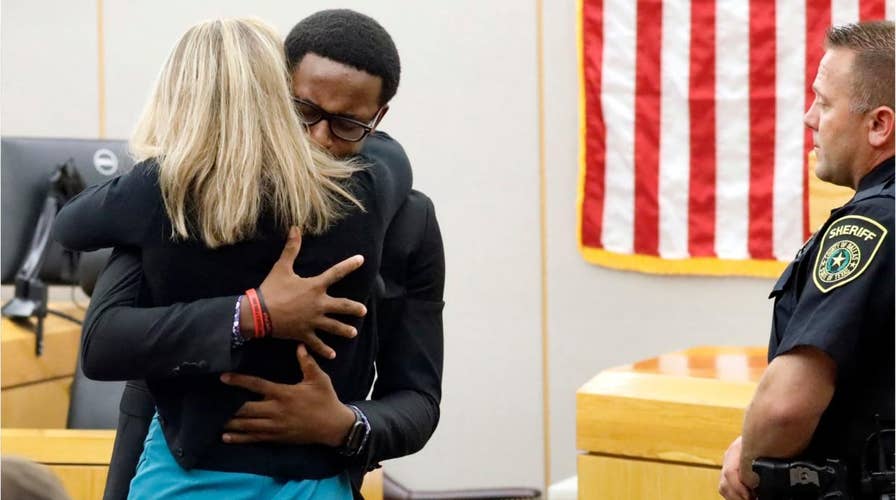Five feel-good stories from this week you don't want to miss
Fox News feel-good stories from the week of Sept. 29 - Oct. 4. Check out what’s clicking on Foxnews.com.
On the night of Feb. 7, 2003, Coco and David Treppendahl got the news that no parent ever wants to hear: their 19-year-old daughter, Laura Treppendahl, had been killed by a drunken driver as she drove home from a Bible study.
The driver, one of Laura’s fellow students at the University of Mississippi, had just driven away from a bar in an SUV with eight passengers inside. Within minutes of leaving, he sideswiped one car and then ran head-on into Laura, who died at the scene of the accident.
I was a law student at the University of Mississippi at the time and recall the way the accident rocked the town of Oxford. Although I didn’t know Laura, countless others did and described her as a vivacious, lovable young woman who was intensely serious about her faith in Christ. Her loss sent a pall over the town.
GUTFELD ON COURTROOM FORGIVENESS
What rocked the town as much as her death happened a year later at the sentencing of the driver, who pled guilty to aggravated DUI death and expressed deep remorse for his actions. Although he faced a sentence of up to 10 years, the judge suspended nine of them, resulting in one year of jail time. The leniency of the sentence got everyone’s attention, but the real shock was a letter to the judge from Laura’s family.
More from Opinion
“We are Christians,” wrote the Treppendahls. “Forgiveness is an integral part of our Christian faith. We have asked Christ and He has enabled us to fully forgive [the driver] and the other young men involved in this tragedy. Therefore, from our own personal perspective, we have no need for nor will we gain any satisfaction from seeing [him] further punished.”
People were moved to tears – amazed that the Treppendahls pardoned the driver so freely and completely. It was the kind of thing you couldn’t help but admire, yet wonder if you could be so extravagantly forgiving if you were in their shoes.
In a follow up letter to the local newspaper, David revealed that he and Coco had met with the driver and forgiven him in person.
Is it any of our business to assess the rightness of mercy, the genuineness of apologies or the social repercussions of grace?
“He is a fine young man who has been broken and humbled," David wrote. "He has come to the end of himself and feels completely helpless. In other words, I found [him] to be just the kind of person that God can really use to accomplish mighty things.”
Not everyone was touched by the graciousness of the Treppendahls though. Some expressed disappointment in the Treppendahls’ decision to advocate for the driver. In their view, the Treppendahls were sending the message that you can get plastered, end the life of an innocent driver and get away with it.
The episode reminded me of what happened in a Texas courtroom this week when 18-year-old Brandt Jean spoke at the sentencing of Amber Guyger, who had been convicted of murdering his brother, Botham.
"If you truly are sorry," Jean said, "I know I can speak for myself. I forgive you. I think giving your life to Christ would be the best thing that Botham would want for you," he said. "I love you as a person, and I don't wish anything bad on you."
CLICK HERE TO GET THE OPINION NEWSLETTER
In a stunning moment that left people in the courtroom sobbing, Brandt got permission from the judge to hug Guyer. It was the embrace felt around the world as the two clung to each other and cried.
It has been both heartening and heartbreaking to look at my social media newsfeeds as people continue discussing Brandt’s extension of grace. The vast majority of people are still overwhelmed by the beauty of the moment, but a crop of others stood up to raise their fists at injustice, to analyze to pieces Brandt's apology – to try to put it in perspective for the rest of the world.
As if it's any of our business to assess the rightness of mercy, the genuineness of apologies or the social repercussions of grace. The Treppendahls extended it. Brandt Jean extended it. It was theirs to give, not ours to evaluate.
CLICK HERE TO GET THE FOX NEWS APP
Grace defies logic. It's just so – unfair. Like the thief hanging on the cross next to Jesus, making his last-minute confession to the Lord and gasping out the simple request, "Remember me." He had done nothing to deserve pardon and yet, in response to this deathbed conversion, Jesus says, "Truly I tell you, today you will be with Me in paradise" (Luke 23:43).
At the heart of our reaction to the Treppendahls and Brandt Jeans of the world is a reaction to Jesus, who issued the pardon of all pardons to everyone through His sacrifice on the cross. Those who fully appreciate the magnitude of that eternal pardon know the great secret behind forgiveness: None of us deserve it and the most freeing thing we can do is give it.
